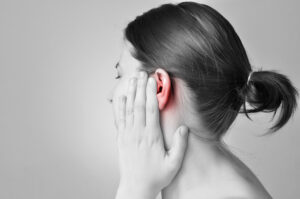
After a dental procedure gone awry [crown > dislocated jaw] my bite was crooked, my face hurt, my ear was tingling and it was challenging to eat. After a series of therapy sessions my smile has returned, symmetrically! The pain is gone. Food is once again delightful! Thank you Dr. Seo!
Pamela H.
How is Ringing in the Ear Related to Jaw and Neck Pain?

Studies show that there’s a close relationship between temporomandibular joint (TMJ) and tinnitus (ringing in the ear). People with TMJ problems are likely to suffer from tinnitus, and people with neck injuries may also suffer from tinnitus. Some people with either TMJ problems or neck problems can alter the intensity of their tinnitus by moving their mouth, jaw, face and neck. Successful treatment of the neck and jaw can improve tinnitus symptoms.
What is the temporomandibular joint (TMJ)?
The TMJ is a complex joint which allows chewing. There’s a tremendous amount of force that is applied through the TMJ because the muscles that make the jaw clench are some of the most powerful in the body. As a result, the joint is at risk of damage just as much as any other weight-bearing joint in the body. TMJ problems can be due to trauma, dislocation to the fibrous disc in the joint, or due to arthritis.
What are the symptoms of TMJ problems?
Most common symptoms include:
- Pain
- Earache
- Jaw clicking
- Grinding and/or clenching of jaw
- Limited movement or locking of jaw
- Swelling of TMJ
- Headaches
- Neck pain
- Tinnitus (ringing in the ear)
How does the TMJ affect tinnitus?
There are three main reason why problems with the TMJ may cause tinnitus, or make it worse.
- The chewing muscles are near to some of the muscles that insert into the middle ear and so may have an effect on hearing, and so may promote tinnitus.
- There is a direct connection between the ligaments that attach to the jaw and one of the hearing bones that sits in the middle ear.
- The nerve supply from the TMJ has been shown to have connections with the parts of the brain that are involved with both hearing and the interpretation of sound.
What can be done about TMJ disorders?
Simple changes such a soft diet, or the use of anti-inflammatory medicines may help for simple cases. For people who grind their teeth or clench their jaw, a bite guard appliance is frequently used; however, research shows that inserting any type of oral appliance will eventually increase activity of the muscles that clench the jaw. Therefore, it is crucial to identify and fix the root cause of clenching and grinding. In exceptional cases surgery may be required to perform surgery on the TMJ. If your tinnitus is related to your TMJ problem, the tinnitus may improve as the TMJ problems get resolved.
How can neck problems be related to tinnitus?
Studies show that patients who suffered head and neck injuries, such as a car accident, or who have neck pain or stiffness for other reasons, such as arthritis, are more likely to experience tinnitus. In addition, nerve endings in the neck make connections in the hearing centers of the brain. Tinnitus is often associated other symptoms such as neck pain, headache, depression, and difficulty with memory and concentration.
Treatment generally depends on the cause of the neck problem, and the results from treating the underlying neck problem are often good. Some people are able to change the intensity of their tinnitus by moving their neck.
If you are currently suffering from tinnitus, jaw pain, or neck pain and want immediate relief, fill out the form below. We serve patients from Bryn Mawr, Radnor, Havertown, Ardmore, Wynnewood, Philadelphia and surrounding areas.

